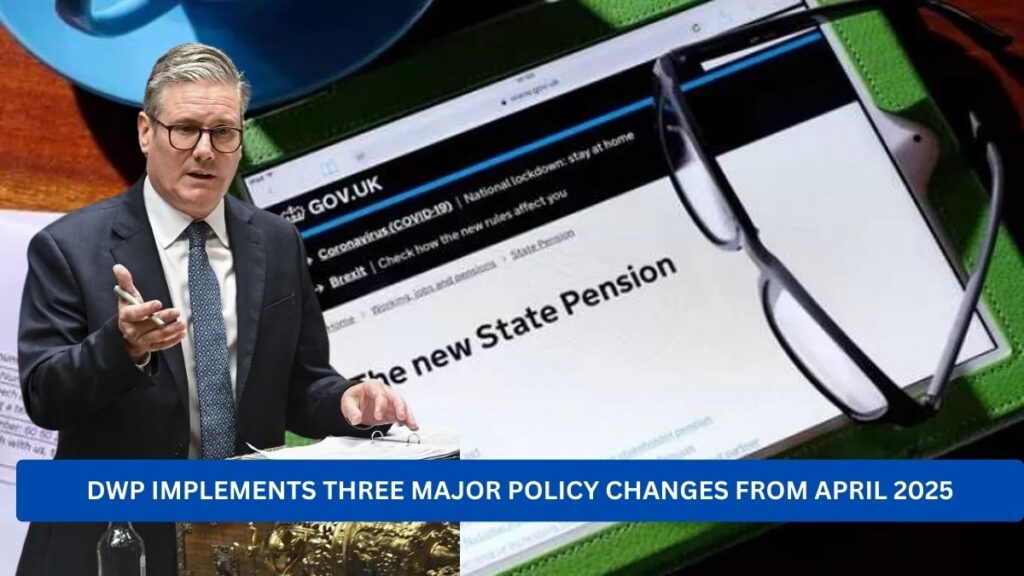As the new financial year begins, the Department for Work and Pensions (DWP) has rolled out three critical changes impacting millions of UK state pensioners from April 6, 2025.
These changes are a mix of good news—such as increases in pension payouts—and challenges like potential tax hikes for older individuals due to frozen allowances.
Here’s a breakdown of what’s changed, how it might affect you, and where to get official help or guidance.

1. State Pension Boost Through the Triple Lock
One of the most welcomed updates for pensioners is the annual uplift in the State Pension, thanks to the triple lock mechanism. This ensures that the pension increases by the highest of three figures: inflation, average wage growth, or 2.5%.
For the 2025-26 financial year, the State Pension has increased by 4.1%, in line with the average earnings growth recorded between May and July 2024.
- New State Pension: Now pays £230.25 per week, up from £221.20—an annual increase of about £470.
- Basic State Pension: For those who reached pension age before April 6, 2016, the rate has risen from £169.50 to £176.45 per week.
These new rates took effect from April 6, 2025, though the first full payment reflecting the increase will depend on individual payment schedules.
2. Pension Credit Uplift for Low-Income Pensioners
The DWP has also increased Pension Credit, a means-tested benefit designed to top up incomes for pensioners who may not receive a full pension or have other financial challenges.
Key changes include:
- Standard Minimum Guarantee:
- Single pensioners: From £218.15 to £238.75 per week
- Couples: From £332.95 to £364.10 per week
- Savings Credit (for those who reached pension age before April 6, 2016):
- Singles: From £17.01 to £18.60 per week
- Couples: From £19.04 to £20.85 per week
Additionally, the capital disregard threshold—which determines how much savings you can have before it affects your benefit—has been raised from £10,000 to £12,500, with the upper limit increasing to £20,000.
These changes are expected to improve financial support and broaden eligibility.
3. Tax Trap for Pensioners Due to Frozen Personal Allowance
Although the pension has gone up, the income tax personal allowance remains frozen at £12,570 until 2028, a policy introduced to curb inflationary pressures.
This freeze means that any pensioner receiving the full New State Pension (now at £11,976.96 annually) is edging closer to the taxable threshold. With even modest additional income—like private pensions, part-time work, or savings interest—many retirees may find themselves pushed into paying income tax.
According to financial analysts, an estimated 650,000 more pensioners could begin paying tax this year as a result. This is a sharp increase and is drawing criticism from age-related charities and think tanks.
BONUS: State Pension Top-Ups Disrupted by HMRC Glitch
In a related issue, around 21,000 people were unable to make final National Insurance (NI) contributions before the deadline on April 5, 2025, due to a system outage on HMRC’s website. This affected individuals aiming to boost their future State Pension entitlement.
HMRC has acknowledged the issue and stated they will contact those affected and offer an extended window to complete their top-ups.

What Should You Do Now?
If you’re a pensioner, it’s crucial to:
- Check your new pension payment in your next scheduled deposit.
- Verify if you’re now eligible for Pension Credit based on updated thresholds.
- Review any additional income sources that could push you into the tax bracket.
- Contact HMRC if you were affected by the top-up service disruption.
For personalised pension planning, consider visiting trusted platforms such as MoneyHelper or Citizens Advice.
Conclusion
While the April 2025 DWP changes bring some financial uplift, they also introduce complexities around taxation and benefit eligibility. Staying informed and proactive will help pensioners make the most of their entitlements and avoid unexpected tax bills.
This article has been carefully fact-checked by our editorial team to ensure accuracy and eliminate any misleading information. We are committed to maintaining the highest standards of integrity in our content.

Himanshu Sharma writes for Weekend Spy, focusing on recruitment, government schemes, and current affairs. He is dedicated to making complex information accessible to readers.
Himanshu enjoys playing chess, hiking, and trying new recipes, always seeking ways to combine his love for writing with his passion for exploration. Connect with Drop him an email at [email protected].







